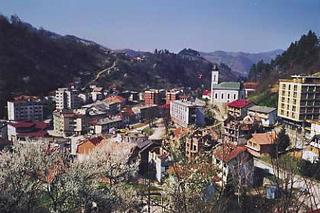
This is Srebrenica, a small town in eastern Bosnia. I was born there on September 18 1979. On April 8, 1992 my family and I had to flee the town because we had been told that it was no longer safe to remain there. No one knew why. I had noticed that many of my Serb friends were for some reason absent from class. I remember that day perfectly well when my headmaster remarked that the Serb students were missing. It turned out that they had been forewarned and urged to leave Srebrenica immediately. Oblivious as to what was going to happen, a large Muslim population stayed behind. Alarmed by the fact that the overwhelming majority of the Serb population had already left the town, some Muslims decided that it would be wise to leave Srebrenica if only for a short while. Little did they know that many of them would never return to Srebrenica again...
My family and I decided to go to our aunt who lives in Ivangrad, Montenegro. We thought that we would stay only for a couple of days before heading back to Srebrenica. Meanwhile the situation in Bosnia was rapidly deteriorating, tension was rampant. I was beginning to fear the worst: war. Approximately a month after our arrival in Montenegro a war broke out in Bosnia. People who had remained in Srebrenica were unable to leave the town. They had been trapped. My grandparents had remained in Srebrenica. Bosnian Serb forces occupied Srebrenica and began shelling the town from the surrounding mountains. Heavily armed, Bosnian Serbs inflicted tremendous damage to the town, whose defenders were practically unarmed. Mortar attacks occurred daily in which many civilians were killed. I was watching the slow but extremely painful demise of Srebrenica on Serbian TV, unable to do anything to help the people trapped in the town. Watching news on the TV became a torture causing permanent damage to the soul.
At that time when Srebrenica was under siege, the Montengrin authorities were capturing Muslim men who had fled to Montenegro from the war in Bosnia. The Montenegrin authorities later deported the captives to Bosnian Serb authorities, sending them to a certain death. My cousins' father and his brother were deported from Herceg Novi (Montenegro) to Bosnian Serb authorities. Presumed dead, their bodies still have not been recovered. May Asim Begic's and Azem Begic's souls forever rest in peace and may those who executed them be severely punished for their heinous atrocities that left a permanent scar on my cousins.
Fearing that my father might be captured as well, we decided to flee Montenegro. The situation at that time was chaotic; we thought we were not going to make it out of the country. My brother and I suffered severe trauma, having had to cope both with what was happening in Bosnia and with the fact that our cousins' father had just been abducted. Also, we were deeply concerned what was going to happen to our father; all of this proved too much for two little boys. We were praying that the Yugoslav authorities would allow us to pass the border and they did. Even though we were facing an uncertain future, we had made it, we were finally safe. We ended up in Sweden and I have since been living here.
On July 12 1995 Srebrenica was overrun by Bosnian Serb army. What happened in the ensuing days constitutes one of the worst massacres in Europe since World War II. Bosnian Serb forces summarily executed approximately 8,000 Muslim men, one of whom was my grandfather Alija Salihovic. My grandmother had managed to get out of the town and later joined us here in Sweden. My grandfather was unfortunately not that lucky. May his soul rest in peace. Today when I ask my grandmother about her three years in Srebrenica while under constant bombardment, with no clean water, electricity and little food, all she says is that she was in hell. One gruesome event that will never be effaced from her memory is a massacre of approximately 30 children who were playing football in the schoolyard. The pool of blood that was there that day has been forever imprinted on her memory. At this point, the two men most responsible for the massacre in Srebrenica Radovan Karadzic and Ratko Mladic are still at large.
A legitimate question emerges here:
Is the international community really putting an honest effort into apprehending them?
Dedicated to Asim Begic, Azem Begic, Alija Salihovic and all Bosnian people who lost their lives in the war in Bosnia.

4 comments:
Post a Comment